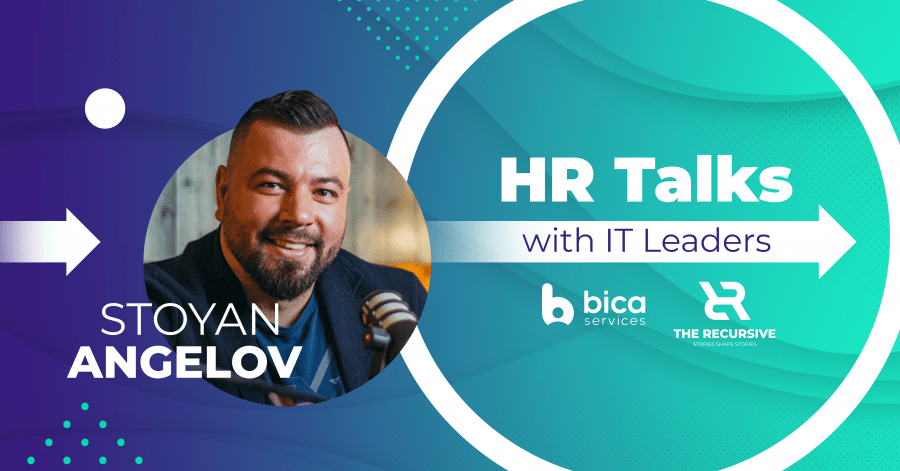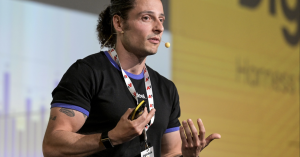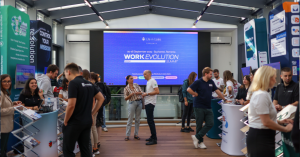HR Talks with IT leaders is a campaign organized in collaboration between The Recursive and BICA Services, one of the most prominent HR service providers in the Bulgarian market. Our goal is to give more visibility to the knowledge of how great tech teams are built. Every week, we will meet with accomplished entrepreneurs and managers who will share their personal experience and what’s their approach to leadership, communication, hiring, talent development, and much more.
Our next conversation is with Stoyan Angelov, founder and CEO of the event management startup Evedo. Operating on over 20 markets all over the world, Evedo’s online ticketing and organization platform helps event organizers book venues and find performers, and enables them to connect and coordinate easily with event participants. Based on blockchain technology, the Evedo platform utilizes the digital ledger to manage the interactions between different parties involved through generating smart contracts. So far, the platform has grown to be used for the organization of over 2350 events. The company recently expanded operations on 10 new markets, including Israel, Kazakhstan, Azerbaijan, and Moldova.
Angelov, who has long been in the event industry with his other event agency Flyevents, says the new markets could mean exponential growth for Evedo. In the upcoming year, the startup aims to further enhance the platform capabilities and raise the number of events it facilitates to over 10K.
+++ HR Talks with IT Leaders ep. 1: Boyko Iaramov on giving back, transparency and leadership
+++ HR Talks with IT Leaders ep. 2: Radoslav Georgiev on the art of scaling your company fast
In your experience, what are the prerequisites for a strong company culture?
For us, it was the development of a code of conduct – a set of rules and values that every member needs to agree on before entering the company – that helped us build a strong company culture. We started Evedo around 3 years ago, with 5 team members, and we have been building this code of conduct since day one as we believe it helps us attract the right people for the company. The set of rules represents our shared beliefs for how we can help each other and function together as a team towards the business goals of the company. For instance, our code of conduct stresses the importance of guiding others and helping each other in case there is a problem, giving feedback, and respecting one another. The ultimate goal is to create a healthy environment in which everyone cooperates actively.
Since the establishment of Evedo, the code of conduct has served as a filter during the recruitment process – it has attracted our current employees while repelling people who do not share these values and beliefs, thus helping us align the team. This value system has helped us when we decided to close all our physical offices, around a year ago, and serves well now that we have expanded our team to 50 people from over 10 countries.
By clearly communicating our core beliefs to each new team member, we have managed to preserve our company culture although some of the colleagues have never met each other in person. From our perspective, encouraging cooperation and interaction between people is among the main reasons why our international teams are on the same page.
How did your onboarding process at Evedo evolve in the past few years?
The main change we have made over the years lies in the creation of a coherent structure of the onboarding process for all of our departments. When it comes to onboarding technological specialists, we consulted with experts on how to gather and structure the documentation that describes our technology infrastructure, as well as the tools and methods we use for maintaining our platform. We also made sure that each new addition to the technical team would have a more experienced colleague to consult with regarding the overall structure of our solution and the working methodology during the onboarding process.
The process we created for onboarding new employees in our other departments is also connected to cooperating with their more experienced colleagues. New team members in the sales and business development unit are taught how to communicate with clients and present the value-added the Evedo platform offers. We have also developed a series of educational videos for training that present the platform’s main benefits and outlines some approaches for efficient communication with event organizers from all over the world. We apply similar educational and mentoring practices to all our division units.
How do you identify the right candidates for your team in the first place and what characteristics do you look out for?
My main strategy lies in communicating with prospective candidates and searching for opportunities that benefit both them and our organization. Currently, I dedicate part of my time every week to talk to potential employees to identify ways in which we can cooperate.
I look out for proactiveness in people – to me, this is the most important characteristic of a candidate as it signals a person is willing to learn new things and enhance their expertise. A candidate who has the basic knowledge but wants to constantly improve and learn new things has more potential than a high-end cadre that lacks flexibility.
Another important thing to me is for candidates not to be afraid to make mistakes as this deprives them of a psychological constraint that could otherwise make them less adaptive and efficient. Mistakes are not taboo but rather something normal on the path of developing a company – the important thing is that one learns from their mistakes and does not repeat them.
In the second part of this interview, we explore Stoyan Angelov’s tips on team alignment, onboarding, and how he is going to measure leadership success.








